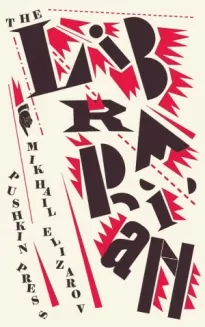The Librarian

- Автор: Михаил Елизаров
- Жанр: Современная проза / Социальная фантастика
- Дата выхода: 2015
Читать книгу "The Librarian"
MOKHOVA
IN THE LATE EIGHTIES and early Nineties skirmishes between clans for Books were especially frequent and especially bloody. The viciousness of Yelizaveta Makarovna Mokhova’s library became legendary. The story of this woman, which in many respects determined the fate of all collectors of Gromov, deserves close attention, especially since a great deal is known about it.
Mokhova grew up in a family without a father. She was a withdrawn little girl who was an average pupil at school and had no close friends, since from the earliest classes she was distinguished by a morbid vanity. After graduating from medical college she lived for two years at her mother’s expense, officially working somewhere as a cleaner, then passed the exams to join the evening department of an institute of pharmacology. During the day she worked in a chemist’s shop.
After receiving her second professional diploma in 1983, Mokhova found herself a job in an old folk’s home.
She enjoyed preparing the medicines there and the laboratory was cool and quiet. Among her powders and test tubes Mokhova secretly revelled in the covert power she held over her decrepit wards, aware that her mere wish was enough for any medicine to be transformed into a deadly poison, and it would be quite impossible to expose the poisoner—Mokhova had been an assiduous student and had a good grasp of the finer points of her trade.
Sometimes, just for a joke, Mokhova would sprinkle some caustic muck into an ointment for bedsores, imagining some old woman scrabbling away in bed as she struggled to reach the source of that fiery itch with her arthritic hand, or goggling blankly at the black ceiling for hours, trying to fall asleep after taking a sedative half composed of stimulant caffeine.
Another few years were passed with these amusements. Mokhova didn’t marry, and for that she blamed her mother, with whom she shared an apartment. As a result of these reproaches, or perhaps of some inner melancholy, the mother died. Without her pension Mokhova didn’t have enough money to live on, and she got herself another job, working half time as a nurse in the women’s section of the Home.
She found it hard there at first. There was a terrible stench in the wards—the bedridden old women relieved themselves where they lay. It wasn’t possible to wash a good hundred patients several times every day, and some nursing assistants preferred to keep the windows open to maintain the flow of fresh air. At first the old women caught cold and died, but the ones who survived actually grew hardier, and the staff suffered more seriously from the freezing cold than they did.
Attempting to fight the stench at its origin, the nursing assistants frequently didn’t feed the especially messy patients adequately. The only thing that the old women were not denied was food for thought; they were always given newspapers, the magazines Health and Working Woman, or the books that were in the library.
Mokhova rapidly found her feet in her new job and, what’s more, she resolved the problem of the overpowering smells far more humanely than her colleagues. Her professional knowledge prompted the answer. Mokhova made up a binding medicine that the nursing assistants added to the old women’s food, and after that even the worst “poopers” relieved themselves in goat’s pellets, and no more frequently than once a week.
The decisive milestone in Mokhova’s life was the day when the extremely rare Book of Strength, known to the outside world as The Proletarian Way, came into the hands of eighty-year-old Polina Vasilyevna Gorn.
It was more than a year since Gorn had lapsed into senile dementia. She didn’t talk much, having lost the skill of speech, but her memory retained the ability to read. She didn’t understand the words very well, but was still able to construct graphic symbols out of them—she no longer needed the meaning. Because of her insomnia Gorn read the entire Book of Strength in a single session, satisfying the two Conditions, and arose like Lazarus. For a while the Book gave her back her pep and part of her mind.
Mokhova glanced into the ward at the noise and saw a bizarre scene.
Gorn, who always lay there in a filthy, soiled nightshirt, was dashing about between the beds with a rapid, mincing gait, grabbing at everything that came within reach. Suddenly halting in the middle of the ward, Gorn gave an agonized cry, as if she had forced a cork out of her dumb throat—“Ilya Ehrenburg!”—and burst into violent laughter. After that the words came tumbling out one after another, like grains of hail falling on a tin roof: “So long ago! It worked! Soldier, soldier! Lady’s! Raw! Lady’s! I forgot, you know!” Gorn tried to name the objects she came across, but her memory couldn’t manage that, and she described their qualities out loud. Grabbing the cushion out from under the head of the woman next to her, she growled: “Lopill? Wollyp? Soft, comfy! Sleepy time!” Or, when she knocked over a box of sewing accessories, she cried out: “Fumble, thumble. Mustn’t prickly! Jab-jab!”
The other old women started falling asleep and Mokhova got ready to tie Gorn down and give her a sedative injection.
Gorn saw the syringe of cloudy liquid in Mokhova’s hand and her eyes flashed spitefully. But she didn’t dare to attack Mokhova and chose a tactical retreat instead. Gorn skipped lightly over lockers and beds, like a goat. Mokhova, who was fifty years younger than her, simply couldn’t keep up. She felt ashamed of her slowness and vented her spite on the women who had now woken up, all popping up on their beds like little roly-poly dolls and following the chase. Mokhova dealt out stinging slaps left and right, knowing that the unfortunate old women’s sclerosis would never let the truth be known.
Mokhova pursued the nimble Gorn with the syringe for a long time, dreaming of jabbing her with the medicine that would freeze her high spirits just as soon as possible. Eventually Mokhova drove Gorn into a corner and tumbled her over onto a bedside locker. Gorn tried furiously to fight Mokhova off, kicking off her slippers and scratching furiously like an animal with all four limbs at once. She wheezed out words that almost made sense: “You’ll dirty! Prostitute! Infect me! Whore! How old are you?” And her hooked nails, which looked like excrescences of amber, ripped Mokhova’s white coat.
After her night-time injection Gorn lay without moving for two days, then she revived slightly and, early on the third evening, reached out her hand for the book. Mokhova didn’t bother Gorn, but as she walked through the ward occasionally, she heard intermittent muttering—Gorn was monotonously reading the book aloud.
At about midnight a racket broke out in the ward again. The same story was repeated, with the difference that Gorn had grown even stronger now and didn’t run away, but joined full-blooded battle.
Soon Gorn was lying strapped down on a bed, tossing her head about wildly, with a crimson bump swelling up on it.
Mokhova had been mauled as badly as Lermontov’s novice in his battle with the badger: her neck, face, breasts and arms were covered with deep, bloody scratches. She was very finicky about her appearance, and the wounds made her absolutely furious.
Mokhova darted across to the bed, swung her hand and punched Gorn hard on the jaw. Her fist felt the crack of the dental plate as it broke.
The old woman pushed the two fragments out with her swollen tongue and suddenly said quite lucidly: “Don’t hit me, Lizka!”
Mokhova had just raised her hand for a second punch… The old woman started squirming about and added resolutely, building sentences out of the growling words: “I’ll. Do. What. I’m. Told. Read. The. Book. There’s. Strength. In. It.”
Gorn told Mokhova everything that she’d understood about the Book. At first Mokhova didn’t believe what Gorn said, but she wiped away Gorn’s blood and applied a cold compress to the bump. Mokhova spent all the next day pondering something, then she volunteered to take a night shift out of turn. The nursing assistant who was supposed to help Mokhova was allowed to go home.
Mokhova hadn’t been intending to read the book herself; she was expecting Gorn to do that, and she was planning to observe her. But the bump on the head affected Gorn’s health badly: after the effect of the Book of Strength wore off, she didn’t even return to her former feeble, semi-demented state; she just slept, groaning intermittently.
Mokhova sat down not far from Gorn, in order to follow her reactions, and started reading aloud. It wasn’t easy; her voice gradually became hoarse and her attention faded. But Mokhova had completed courses in a training college and a higher institute, and she knew how to cram.
Early in the night Mokhova completed the Book. Silence reigned in the ward. Mokhova looked at Polina Gorn and shuddered in surprise. The old woman was already sitting up on the bed with her legs dangling over the side like black branches.
“Lizka!” Gorn barked, but in a perfectly amicable manner, and started darting about the ward, working off her excess strength.
Suddenly the other old women started getting up. A cold shudder ran down Mokhova’s spine. The Book hadn’t started to affect her yet. Reading aloud, directing the words outward, not into herself, had retarded the effect. Slipping out into the corridor, Mokhova locked the door of the ward and set a chair against it, in order to observe what was going on through the window above it.
What she saw was both terrifying and amusing. The old women were making extremely strong, sweeping movements with their arms, making it look as if they were hugging themselves, and jerking their legs out forward like the soldiers who guarded Lenin’s mausoleum. At the same time the expressions on their faces were a succession of every possible contortion and grimace. Sometimes the old women blurted out words—“intestine”, “health”, “labour merit”—or else they simply laughed.
Like Gorn on that first night, they tried to name the objects around them. “Spenil, Pilsen!” an old woman with tangled hair shouted out, looking at a ballpoint pen. “Make letters!”
“Plamp!” howled another, staring at the ceiling.
A third one chanted: “Kittle! With warm water!”
A fourth one grabbed hold of an alarm clock and wheezed intensely: “Lome! Lome! Tefelome! Don’t remember!” And she growled furiously: “Tame!”
When they crashed into each other, the old women tried to introduce themselves; “What name? Anna Kondratyevna! Forgot what I wanted! How old? And my name’s Tarasenko! What name? Krupnikova. Anyway, it was a good dress. And we ate well! What did you eat? Is your name Alimova? Galina! Alimola? I told you, old you, sholed you. You’re called Galina? Galila. Dalila. How old are you? Six point two roubles. No, point three roubles!”
When she saw Mokhova’s face pressed up against the glass in the door, the old woman with the alarm clock shouted out ferociously: “Mirror!”
Mokhova’s fear left her when she felt the Strength. And from that moment on she thought about how to make use of this property of the Book that had been revealed to her. Naturally, she didn’t intend to write a sensational article for a medical journal.
Her thoughts were interrupted by a heavy blow against the door. The old women had lined up into a live battering ram, determined to break out.
Mokhova wasn’t afraid of the encounter. She already knew that the berserk old women could be subdued and pacified. Gorn’s example proved that. Mokhova had prepared a club in advance—a length of high-voltage cable with a heavy tin-bound core of metal wires.
A blow shook the door. Bed castors squeaked across the linoleum. Mokhova understood the tactical concept when the glass in the window above the door flew out and an old woman appeared in the aperture. The metal mesh of a bed had served as an excellent trampoline, tossing the old woman two metres up into the air. There were still fragments of glass in the frame and the old woman had impaled her stomach on them. Bleating in fury, she carried on trying to crawl through. Inverted Himalayas of blood slowly oozed down the door, making it look as if the old woman had put out bloody roots.
The second assault was launched more successfully. First a mop flitted about in the broken window, knocking out the shards of glass. A metal mesh bed base creaked again and a different old woman flew into the opening and started climbing down the door into the corridor.
Before the old woman could crawl out, Mokhova stunned her with a blow of the club. Then she opened the door and skipped back a few metres.
The old women came piling out of the ward and surrounded Mokhova. Gorn stood beside the door, indicating that she wasn’t getting involved in the fight.
The old women raged and howled, but they didn’t dare attack. Anyone who bared her teeth, as if she was about to pounce, earned a heavy blow from the club. Eventually an old woman by the name of Reznikova assumed the role of leader.
Stepping forward, she fended off a blow from the club with the mop. She raised her hand, calling for silence. Mokhova was in no hurry and she let the old woman have her say. An utterance vaguely resembling coherent speech followed; “Now, in the first place, first of all! We have to do! The same way as yours, that time! Today I did forgot, as they say! I did very bad today!”
The old women started murmuring approvingly in response to this gibberish and only Polina Gorn asked: “Reznikova, are you married?”
“Four years already!” Reznikova snarled, then swung round ferociously towards Mokhova, flinging up the mop.
The heavy cable whistled through the air and reddish-brown glop splashed out of Reznikova’s mouth onto the wall. Mokhova swung her arm back again and the old women trudged into the ward, whimpering discontentedly.
The pacification was achieved with minimal casualties: Reznikova had a broken jaw and the old woman who got stuck in the window over the door had deep cuts on her stomach. The injured were carried onto beds and Mokhova gave them first aid.
The effect of the Book was soon exhausted and the old women started dropping where they stood, like wind-up dolls in which the spring has run down.
Mokhova dragged the bodies onto beds, washed the blood off the door and swept up the glass.
The second group reading was not accompanied by any outbursts of aggression against Mokhova. The old women submitted to her completely, for which most of the credit belonged to Gorn, who influenced her comrades by using both argument and the club, which Mokhova had personally handed over to her, conferring upon her local authority.
Polina Gorn’s former garrulity did not return; her mind became rational and her thoughts succinct.
On Gorn’s advice Mokhova held new readings in different wards during the week. Gorn herself and about ten pacified old women attended the reading in order to suppress any possible focal points of rebellion.
The militia expanded every time that Mokhova was on duty. The Book had a salutary effect on senile organisms. In their normal condition, of course, the old women still did not possess even a hundredth part of the strength that the Book gave them, but their minds remained relatively clear.
In part they attributed the miraculous effect of the Book to Mokhova. They were old, lonely and abandoned by their own children, and the lingering spark of motherhood still glimmered in their hearts. Not the raucously domineering kind, but the self-sacrificing kind.
Gorn picked up this mood among the old women. The next night Mokhova was dubbed the “little daughter” and the old women were dubbed the “mums”. Gorn had thought through the ritual of adoption very thoroughly. In Mokhova’s view it was not particularly pleasant or hygienic, but Gorn persuaded Mokhova to go through with it.
Every old woman smeared Mokhova’s face with her vaginal secretions, as if symbolizing in this way that Mokhova had appeared in the world via her womb, and swore to protect the “little daughter” to her last breath.
Sixty old women went through the ritual. Twenty or so recent converts watched them, raging and roaring—and in the meantime they were pacified by overseers who dealt them slaps round the back of the head to drive home the idea that the greatest happiness they could ever be granted was to become a “mum” as soon as possible.
That same night Gorn said to Mokhova: “The staff! Get rid!”— and ran her hand across her throat, imitating the movement of a butcher’s knife.
The time had come for decisive action. Someone had snitched to the director about the noise at night, the broken window panes and the bruises. It was obvious that these emergencies occurred during Mokhova’s shift, and she could have faced serious unpleasantness. To carry out the operation Mokhova had the faithful Gorn and a militia of about eighty old women in total.
Mokhova informed the director, Avanesov, that at the weekend she intended to hold a recreational reading session in the women’s section, because she believed that the old female patients needed it. Avanesov did not object.
At eleven in the morning the female half of the old folk’s home started stirring. The corridors were filled with the creaking of beds being trundled about as the ambulatory old women moved their bedridden friends to the site of the assembly.
Mokhova was already experienced in reading rapidly and intelligibly, and she ran through the text in record time. Curious nurses came down several times from the men’s floor above. They were told that everything had been agreed with the director. One way or another, Mokhova won herself three hours’ grace. And when the duty sister called the director at home and complained about the pandemonium that Mokhova had caused, it was too late.
Avanesov arrived in time for the final pages. He curtly ordered the patients to be taken back to their wards. Mokhova openly raised her voice. Avanesov repeated his order, again in vain. He threatened to sack Mokhova for these outrageous excesses. The nurses and nursing assistants came running at the sound of his shouting. Taking hold of the heads of the beds, they started trundling the old women away to their wards. Seeing Mokhova still not responding to what he said, the director started walking towards her. And in that second Mokhova shouted out, “The End!”—and clapped the Book shut.
At that very moment the old woman Stepanida Fetisova grabbed the drip tube out of the vein of her ward neighbour Irina Shostak and deftly flung this improvised garrotte round Avanesov’s neck. Deprived of her flow of medication, Shostak fell into a coma, from which she emerged a minute later when the Book took effect.
The rebels were unstoppable. The slaughter began and Avanesov, strangled with a drip tube, became the first victim.
Mokhova’s army went through its baptism of fire at its official place of residence. As victims for its lynching it had four nurses, five nursing assistants, three female cooks, two dishwashers-cumservers, the building manager, the caretaker, who also doubled as the electrician and plumber, and all the patients in the men’s section, about fifty in total.
The old women had been divided in advance into squads of ten. Each squad was led by a sergeant-mum, who took her orders from Mokhova or Gorn.





